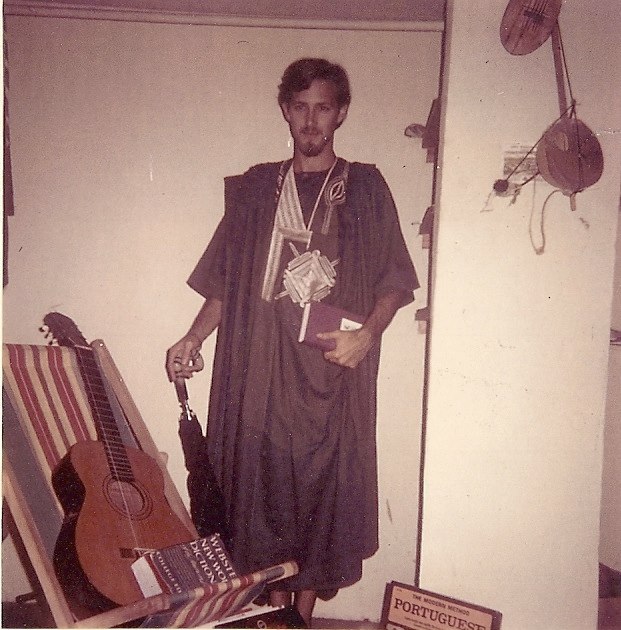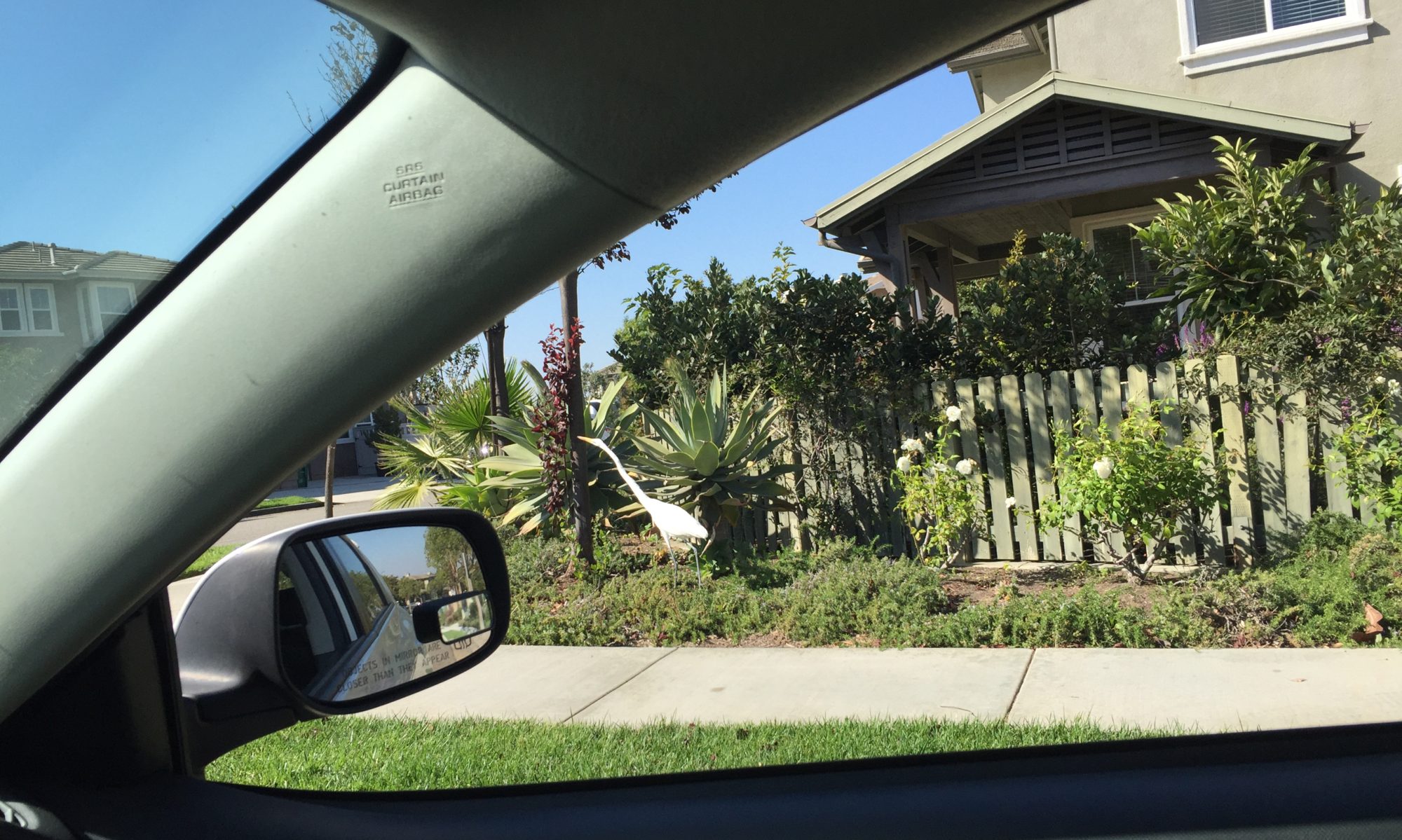Below the photo, my rhymed translation of Rimbaud’s Le bateau ivre. Comments follow the poem, as does a link to the original French. Without having discovered Rimbaud at 16, I probably would have taken to French and have sojourned in Africa anyway. But I was doubtless pushed along those paths by this 19th century and strictly adolescent poet, who abandoned poetry before he was 20, living out almost another two decades of travel and vagabondage, much of it in Ethiopia.

*
As I was being dragged down sluggish rivers
suddenly I felt slip the ropes of my haulers.
Whooping redskins had emptied their quivers,
nailing them naked to stakes of many colours.
I didn’t care a fig what happened to the crew
nor the cargo of Flemish wheat, English cotton.
Once the drudges had ceased their ballyhoo
I let currents bear me where I’d never gotten.
That winter, dumber than the brain of a baby,
I crossed the furious chopline of tidal spew.
Peninsulas shorn from their shores maybe
never know such triumphant tohubohu.
Storms then consecrated my transfiguration.
For days I bobbed, a lithe cork on the chaos
of swells which send many to their damnation.
Never did I miss the guiding eye of a lighthouse!
Green water soaked the timbers of my deck,
sweet as to a child the pulp of a sour apple.
Swills of blue wine and gushes of vomit broke
over me, ripping away rudder and grapple.
At long last I bathed in the Poem of the Sea,
infused with lustrous stars like the Milky Way
glowing through aquamarine depths whence float free
pallid, pensive corpses who have seen their day.
Delirium and pulsing rhythms more intense
than alcohol, more boundless than our lyres,
beget love’s sullen, bitter rubescence
and tinge the indigo with sunset’s ruddy fires!
I knew dark skies ablaze with lightning shocks,
waterspouts, backwash, undertow. I knew twilight
and dawn exultant as doves rising in flocks.
I have seen what others thought they had in sight!
I saw plunging suns, blotched with mystic terror,
shining on strands of purple clotted clutter
and, like masked actors faced with tragic error,
distant waves closing a shivering shutter!
And I dreamed a green night with dazzling snow,
kisses rising slowly to the eyelids of the main,
the inner coursing of unknown saps aglow,
the blue-yellow tones of a fluorescent strain!
For whole months I followed like hysterical
herds the assault of swells on coral reefs
never dreaming that Mary’s chimerical
feet could muzzle the Ocean’s wheezy puffs!
I crashed into fabulous Floridas where
flowers bore panthers’ eyes in the skins of men.
Rainbows like taut luminous bridles were
tethered to squalid flocks beneath the sea’s rim!
I saw gigantic swamps in ferment, trawls
where a whole snagged whale rotted in mushy reeds!
The precipitous collapse of waves in lulls
between storms which unleash chasms of cascades!
Glaciers, silver suns, nacreous floods,
skies on fire, foul harbors on brown shores of doom
where giant snakes smitten with bloodsucking slugs
flop like twisted trees, venting dark perfume!
I would have loved to show a child the bream
swimming in this blue, these golden fish which sing
the foam of flowers where I sought winter’s dream,
the ineffable winds on which I took wing.
Sometimes feeling martyred, of zones and poles spent,
my lurching was calmed by the sobbing of the seas
tendered like a purfled blossom posy meant
for me to take as would a woman on her knees ….
Almost an island, my tossing deck aswarm
with pale-eyed gulls oozing slime and gossip,
I sailed on, watching the drowned in a storm
slip away and sink ass-first into deep sleep!
But, veiled by the cove’s hairy head
then cast by tempest into birdless azure,
I would never fish out those waterlogged dead.
Nor would a square-rigger or man-of-war.
Free, smoldering, from purple mist wrought,
I burst through the heavens’ reddening wall
lugging sun-bathed lichens and cerulean snot,
exquisite conserves which hold poets in thrall.
On I cruised, electric phases of the moon
lighting my mad bark, ushered by a black seahorse,
as July with its hammer blows of heat at noon
turned cyan skies into funnels of angry force.
And I who, trembling, heard maelstroms roar and moan,
fifty leagues away, behemoth mating calls,
miner of yore of the deepest cobalt known,
I grieve now for Europe and its crumbling walls.
I saw archipelagos, atolls whose sidereal
empyrean can be glimpsed only from an isle.
“O countless golden birds, O vigorous Real,
is it in these bottomless nights you sleep in exile?”
True, I wept too much. Dawns are full of horror.
Every moon is atrocious; bitter, all suns.
Acrid love has brought but thrilling torpor.
O let my keel split! Take me where the sea runs!
The chill murk of a puddle is all I wish
for in Europe! Under a fragrant twilight sky
a wistful child would crouch there with a flourish
to launch a boat frail as a May butterfly.
O Seas, I can no longer abide the aims
of merchant ships, their wakes and waves,
nor suffer the pride of flags and oriflames,
nor brook the horrid gaze of galley slaves.
*
I have written elsewhere about my first encounters with Rimbaud (Not All that Beat Either). A influencial high school teacher lent me a copy of the biographical potboiler The Day on Fire, which is still in print. He ‘explicitly hoped that I would find my way to emulating Rimbaud not in his precocious poetic achievement, a rather implausible prospect, but in his scandalous relationship with the older poet Paul Verlaine’.
Soon I was parsing out the French side of the New Directions en regard edition of A Season in Hell. That translation was accompanied by the same translator’s version of The Drunken Boat. Louise Varèse, who was married to the early electronic composer Edgard Varèse, did a great job with both canonical texts. Like most translations of the latter poem, in rhymed alexandrines, hers was in free verse, which made Rimbaud come across even more modern than he was and sought to be: as he famously said: il faut être absolument moderne.
Samuel Beckett put his version into unrhymed lines “of roughly equivalent rhythm” to the alexandrines. His version can be found at the end of this academic comparison of the French and Beckett’s English. There was a Persian translation by Mohammad-Ali Sepanloo as کشتی مست,
and also a Russian version by Vladimir Nabokov, which, we are told — those of us with scant Russian — respects both the rhyme scheme and the verse forms of the original. If so, he was truly il miglior fabbro, to cite Dante about the Provençal poet Arnaut Daniel, and T.S. Eliot about Ezra Pound. Note that both Dante and Eliot referred implicitly to making, to craft.
So there was surely no academic need for another translation, and in this age of rampant free verse and colloquial speech acts as the basis for poetry, for sure no demand for a rhymed one. The contemporary reading public reacts to rhyme much the way I did when I was 16. How much I preferred then the prose poems of Rimbaud’s Illuminations and Season in Hell, though in retrospect I probably didn’t understand much if any of these astonishing, themselves hallucinatory works.
The slowly dawning recognition that, since assonance and consonance are integral devices in poetic language, there is no reason not to embrace or at least to work in terms of the larger patterns of sound which rhyme forms contain.
So lately, latterly, I’ve been rhyming. See 2018: A Great Year for Translation. Two other recent rhymed translations of Rimbaud as linked after this comment.
In the present version I only on occasion resort to slant rhymes. I saw no reason to embrace alexandrines, which always feel wordy to me in English. Rather, as if by default, I found myself using a five stress pentameter, a form which has an iambic feel even when not. This requires a certain compression, given that my translated lines are a foot shorter than Rimbaud’s. I don’t think I’ve left anything important out.
*
This translation with the French original is here
Two other Rimbaud poems in translation:
Au Cabaret vert
Sonnet du trou du cul
Other references to Rimbaud in my blogs:
Not All that Beat Either
My Black Orpheus
Frame
